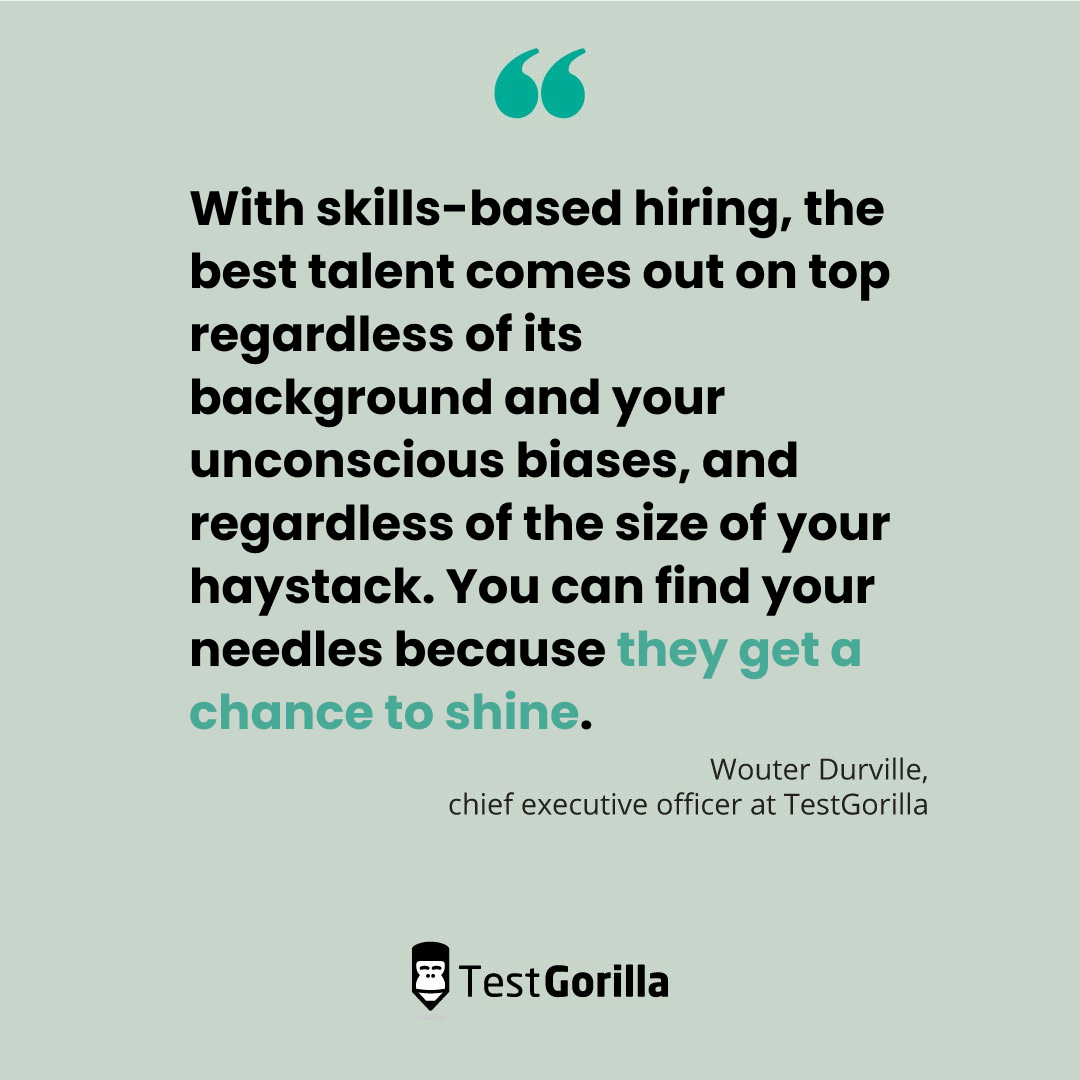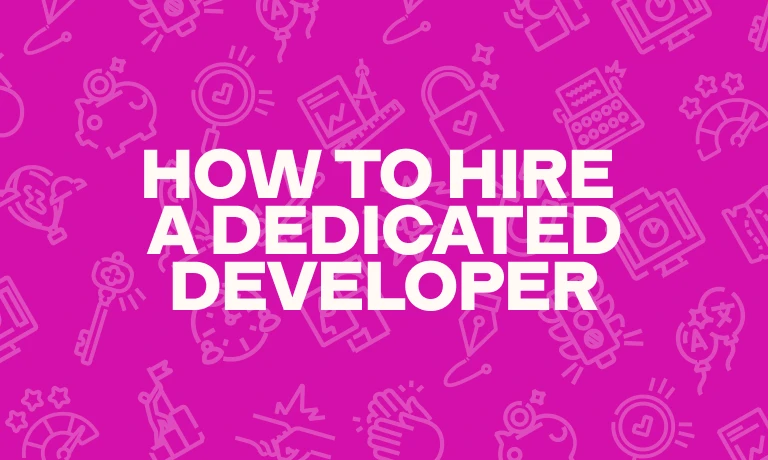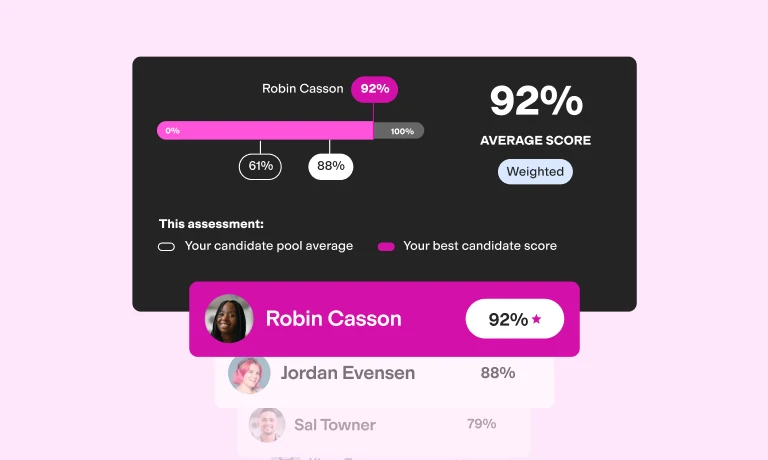The ugly truth about degree inflation: How it hurts companies and candidates
Millennials were all told they had to go to college if they wanted a good-paying job, so they did. Now, they’re the most highly educated generation of all time. And the college degree that used to be a guaranteed way to get ahead has become the new high school diploma – a concept that’s been termed degree inflation.1
Employers often insist on degrees for jobs that didn’t previously require them. This is a problem that’s been accelerating for the last two decades, and it’s unfair to both candidates and employers.2 It creates the paper ceiling that limits candidates’ access to opportunities and employers’ access to top talent.
The good news is that companies are finally starting to move away from degree requirements and embracing a skills-based approach. It’s a smarter strategy that creates a more diverse workforce by letting employers identify the right candidates, regardless of their education level. Even the US Government (an entity not exactly known for innovation) got on board in 2020 by officially replacing degree-based hiring in favor of a competency and skills-based approach.3
It’s time for your company to seriously consider dropping degree requirements and shift your focus to what really matters – skills and abilities.
Q&A
Let’s start with a quick Q&A about degree inflation.
What exactly is degree inflation?
Degree inflation is the widespread insistence on a degree as a job requirement. The result is that there are fewer job opportunities for job seekers who don’t hold a degree. Often, jobs that list degree requirements don’t even require degree-level skills. To give some numbers to the scale of this discrimination, only 7% of the world’s population hold a Bachelor’s degree.
Why is it happening?
Degree inflation is generally thought to be the result of increased access to higher education, but it’s also due to the growing role technology plays in the workplace. Increased automation means workers need the skills to work with technology, and many employers see a college degree as synonymous with having the skills to use a computer or iPad, or to work with software such as Excel.
How do you measure degree inflation?
Harvard Business School defines “the degree gap” as “the difference between the percentage of job postings requiring a degree and the percentage of the current occupants of that position possessing one.” In 2015, degree gaps of more than 40% existed in jobs ranging from front-line supervisors in landscaping and construction, to Surveying and Mapping Technicians, to Executive Secretaries
Degree inflation: 4 downsides for your business
Despite some organizations doing away with degree requirements in favor of skills-based hiring, an overwhelming majority are sticking with it. Research from Cengage Group found that only 9% of employers don’t require a degree for entry-level jobs. Being in the majority is usually a good thing, but in this context, it has a lot of downsides.
1. Degrees are an inaccurate performance indicator
Degrees don’t guarantee a candidate’s ability to excel in a role. They’re actually a lousy indicator for predicting job success. After analyzing 26 million job postings and surveying 600 businesses, Harvard Business School found that college graduates have lower engagement levels at work and a higher turnover rate.
With skills-based hiring, job seekers can show off their knowledge and experience (something a college degree won’t reveal), and candidates who got their experience through self-study, on-the-job training, or vocational programs can finally get a fair chance.
2. Degree requirements shrink your pool of talented candidates
Not everyone can or wants to go to college – half of Gen Z students don’t think they need a four-year degree to be successful. By requiring a degree for every position, you’re missing hundreds or thousands of talented people with non-traditional learning experiences.
To put it in perspective, only 37.9% of people over 25 in the US have earned a bachelor’s degree or higher. That means you’re arbitrarily reducing your choices by almost 60%.
With skills-based hiring, you’re not limited to a finite pool of candidates who meet specific qualifications – you can hire the person who best fits your needs. As many as 1.4 million jobs could open up to workers without degrees if companies focus on skills-based hiring, says Burning Glass Institute, a Harvard Business Review research partner.
3. Degree inflation undermines your DEI efforts
If your company requires degrees for every job, you may be unintentionally engaging in bias and discrimination. Individuals with low incomes, BIPOC, and those with disabilities are disproportionately impacted by degree inflation. According to one study, four-year degree requirements automatically screen out 83% of LatinX and 76% of African American candidates.
Workers from older generations are also affected by degree inflation. When Generation X and Baby Boomers started their careers, degrees weren’t required for most entry- and mid-level positions. In 1980, just over 16% of the US population aged 25 and older graduated from college. Degree inflation leaves these generations out in the cold, even though they’ve got tons of experience and skills to bring to the table.
Skills-based hiring is the key to unlocking a more diverse workforce. By focusing on a candidate’s skills and experience rather than credentials, you can tap into a wider pool of talented people with varied backgrounds. And by losing the degree requirement, you’ll also be actively working to eliminate any unconscious bias that may be hiding out in your current processes.
4. Degrees don’t equal on-the-job skills
Degree inflation can cause a mismatch between skills and job requirements. If a candidate meets your education criteria but doesn’t have the right skills, they will struggle on the job. This disconnect creates a vicious cycle for both you and your mismatched employees – over time, they’ll lose motivation and disengage, costing you a substantial chunk of change in lost productivity.
The best insights on HR and recruitment, delivered to your inbox.
Biweekly updates. No spam. Unsubscribe any time.
How can you stop degree inflation?
The answer: Adopt a skills-based hiring strategy.
Skills-based hiring is the antidote to the pitfalls of degree inflation. It opens new doors for job seekers and gives you more opportunities to hire the most skilled people. It’s a smart move for any company looking to stay competitive. Apple, IBM, and Tesla think so, too – they’ve already made the switch.
Wouter Durville, our chief executive, notes, “With skills-based hiring, the best talent comes out on top regardless of its background and your unconscious biases, and regardless of the size of your haystack. You can find your needles because they get a chance to shine.”
Using skills-based tests during the hiring process is a great way to see if a candidate has what it takes to excel on the job. Instead of just looking at their credentials, these tests can show you how well they can actually do the work required. For example, a marketing department might have applicants perform an exercise that simulates a social media crisis, tests their ability to handle it, and formulates an effective communication plan.
Ready to embrace skills-based hiring and end degree inflation? Here are 3 tips for getting started:
Focus on the skills and abilities required for each role. Job descriptions and responsibilities may need to be rewritten to accurately reflect the position’s requirements. For instance, instead of requiring a four-year degree, you can add “or four years of experience with…” and include skills that align with the role.
Rethink the way you recruit. Instead of asking for degrees, use skills tests to identify candidates with the right expertise for the job. Pre-employment screening identifies the best candidates at the start of the recruitment process by giving job seekers an unbiased chance to demonstrate their skills.
Educate your hiring managers on the benefits of skills-based hiring. Hold training sessions to teach hiring managers how to identify promising candidates based on their skills. It’s also helpful to give hiring managers strategies for assessing candidate skills, like how to conduct behavioral interviews and skills assessments.
Don’t be afraid to think outside the box. Instead of posting to the same job boards, reach out to communities and organizations in your field. Industry trade groups, for example, attract members with extensive on-the-job training and specialized experience but no degree.
Sources
Millennial life: How young adulthood today compares with prior generations (Pew Research, 2019)
Skills-based hiring is on the rise (Joseph B. Fuller, 2022)
Modernizing and Reforming the Assessment of Federal Job Candidates (US Government, 2020)
Related posts
You've scrolled this far
Why not try TestGorilla for free, and see what happens when you put skills first.




















